What does critical thinking mean?
Critical thinking skills are not about criticizing. Criticizing is often understood as “putting down” or “nagging.” And often, criticism is rejected.
But being critical does not mean “putting down”; it comes from the Greek kinesin = to distinguish, which is the starting point of questioning and analyzing.
Daily, some screens flash around us with news, opinions, stories, and entertainment. Mainly, social media plays a significant role. We read, hear, and see about life hacks and tips; some may be educational and helpful. But some indoctrinate and cause people to stop using their brains and think and act independently.
“The important thing is not to stop questioning.” – Albert Einstein.
Have we forgotten how to think for ourselves?
Unfortunately, after observing what has happened in the last three years, the answer is “yes.”
No wonder many believe what TV and social media tell them about what to do and think, and slogans about what to be and have. And there is the generation that grew up with gadgets and the internet, and schools that made them memorize things instead of asking questions. Many no longer seem to think for themselves. The media gives tips for all situations in life and also spreads fear. Nobody asks questions or seems to think clearly about it anymore.
See Do You Allow Yourself to Be Manipulated by Your Own Fears?“
We can’t expect critical thinking from students who’ve only been taught to memorize and obey. Curiosity is not a distraction. It’s a superpower.” – Neil deGrasse Tyson.
“The one real goal of education is to leave a person asking questions.” Max Beerbohm
Follow reason and intuition.
What about reasoning? What about intuition?
Everyone has an intuition or a gut feeling, and some act on it independently. Reason and intuition show us the right way. Independent thinking is encouraged.
There are books and literature for everything and everyone, relevant articles, and everybody can do research or a Google search quickly. These days, there is even trustworthy alternative media. It is not a good idea to turn off the brain.
Read > A Marvelous Mind is given to you – use it.
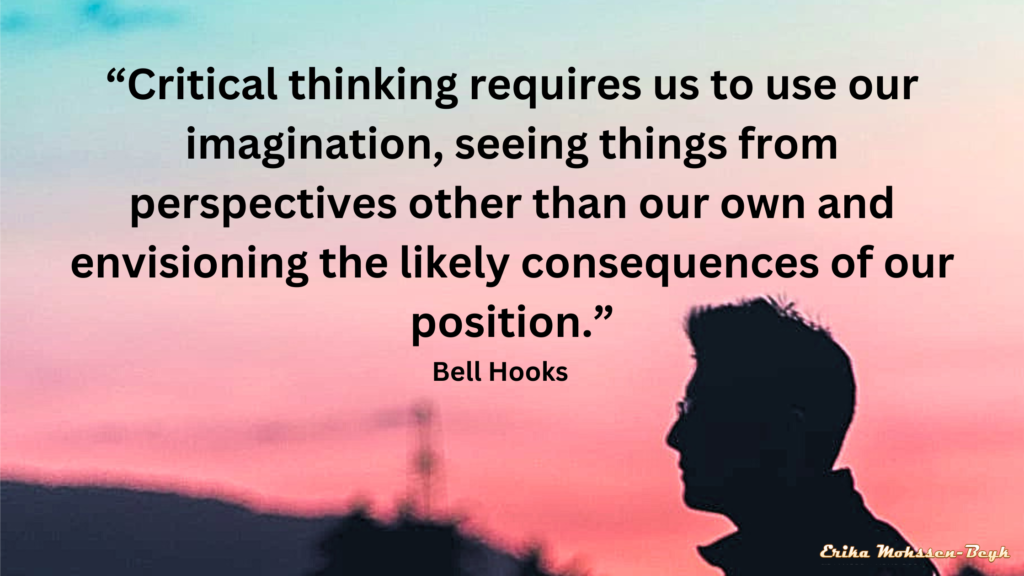
In a world full of questionable information, it is crucial that we think critically and not accept and believe everything that we see and hear.
Today, we are dealing with disinformation, fake news, fake profiles, fake products, and, recently, deep fake AI.
See also >Have You Ever Thought of the News in this Particular Fashion?
In times of fake news, it is good to think deeply and critically about the truth, from the truth of scientific knowledge to existential realities to the political truth.
See > The Weaponization of Psychology.
“Follow the path of the unsafe, independent thinker. Expose your ideas to the danger of controversy. Speak your mind and fear less the label of crackpot than the stigma of conformity.” Thomas J. Watson, Sr.
See> Moronization Is Going On, But Do You Keep Thinking And Improving?
Following the crowd
Many people only think in black and white and seem to have forgotten how to question things critically or include common knowledge. One of the worst tendencies is to follow the crowd. What the public does, the individual does without any critical questioning. Watch > Jason Christoff – Exposing Mind Control.
It is comfortable to hide behind a mass of people who think alike and generate perceived strength – the mass formation? But the crowd only works with slogans, not complex thought patterns.
These days, critical questioning is not only lacking; it is no longer desired.
See > Tell-Lie-Vision
Those who think less critically tend to believe in conspiracies.
The so-called conspiracy mentality has gained ground. A perceived loss of control and distrust of politics has increased in some since the Plandemic.
Critical thinking can also protect against a conspiracy mentality.
When does someone go from healthy skepticism to a conspiracy mentality? Critically examining what the media tells us can help us not to fall for fake news.
If someone believes in conspiracy theories, they are unlikely to back down when told they lack critical thinking. Instead, it might reinforce his beliefs.
People who believe in conspiracy stories need first training in critical thinking because they are not questioning anything and are often not responsive to arguments.
Critical thinking is an aspect of an independent and self-determined personality that does not mindlessly follow what others say.
See also: I love Conspiracy but not the Theory. And> 1 Analogy for Waking Up Your Sleeping Mind
This young man got it – Critical thinking is an art.
In a world of artificial intelligence, critical thinking is an invaluable asset.
Artificial intelligence programs have reached a high level of functionality. They are knowledge-based machines capable of handling tasks and tests, as well as many humans. With all this available information, we must remember one essential human skill: critical thinking.
Critical thinking is a combination of learning and receiving information, and thinking about that information in an unbiased way. And it is a form of emotional intelligence that needs practice as we learn and grow.
In a time when AI-generated content is everywhere, critical thinking is essential. It is a skill, and there are easy ways to develop it.
Critical thinking is now more important than ever. Information comes to us in real-time across the entire globe. It is necessary to have the skill to overview, analyze, and correctly classify the data. The talk about fake news makes it essential to think critically and ask questions instead of accepting it. Watch here
If we do not use our brains, our ability to think and reason will atrophy. Then AI, or rather its owners, will rule our lives.
Watch > How Does AI Affect Human Sovereignty?
How to strengthen critical thinking
It doesn’t matter what information you look at, start by checking the source. Always question how trustworthy the source is and do your own research. How up-to-date is the information? Does it come from a source of expertise and competence?
“It is the mark of an educated mind to be able to entertain a thought without accepting it.”Aristotle
Change perspective
To practice a critical perspective, you can look at different points of view of your information or subject. Can you back them up with verifiable facts? Accept that your perspective is just an opinion, but that doesn’t automatically make it an indisputable truth.
Remain open to other views and points of view, and do not avoid discussions.
You may find that other perspectives can also be helpful, and you can adopt these perspectives.
Be proactive, not reactive.
Many of us react to problems and challenges without considering another way to exist: to be proactive.
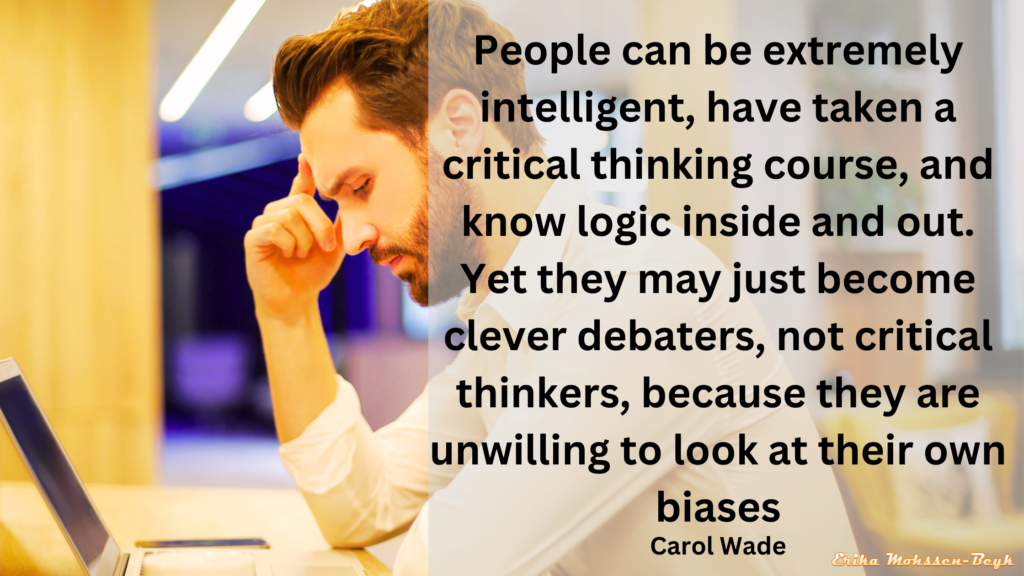
Discuss and argue
Discussing and arguing trains your critical thinking skills immensely. Be open to other opinions, arguments, and suggested solutions, and part in discussions.
Exchange ideas with people. Question what others have said or written, and check whether the person can back up arguments with facts and examples, or whether they contradict themselves.
Go deeper and question the circumstances.
Another essential step in critical thinking is questioning supposed circumstances. Nothing stays the same; there are always life changes. So if you hear something like:
“That’s just the way it is. .” Or “We have to do it this way; there is no other way,”
Then, critically question such statements, think for yourself, and examine the circumstances. It is the only way to grow and find solutions for the future.

“You have a brain and mind of your own. Use it, and reach your own decisions.”—Napoleon Hill.
Keeping an open mind is one of the most essential foundations of critical thinking. This applies not only to opinions that do not correspond to our own but also to getting new information, expanding knowledge, and incorporating different perspectives, concepts, and ideas into conclusions and decision-making.
Distinguish between opinion and judgment.
It also helps with critical thinking if you know the difference between opinion and judgment.
Having and expressing your own opinion does not mean thinking critically.
A judgment is a reasoned opinion. You know all the facts and can decide about the matter. It needs a critical examination of the topic, including your opinion.
“Be curious, not judgemental.” — Walt Whitman
Critical thinking skills also help your creativity, encouraging you to consider different perspectives and find innovative solutions to problems.
“Freethinkers are those who are willing to use their minds without prejudice and without fearing to understand things that clash with their own customs, privileges, or beliefs. This state of mind is not common, but it is essential for critical thinking.”- Leo Tolstoy.
See also One Big Problem In The Truth Movement
See > Finding Truth: How to Navigate a World of Deception and Manipulation
Skills like critical thinking, creativity, and intuition characterize us as humans and are crucial in the age of artificial intelligence.
As AI becomes more integrated into our daily lives, critical thinking skills must be sharp. It is good to stay grounded in the physical world and practice empathy.
Critical thinking can help us in many situations. Not only does it help us understand who we are and what we believe in, but it also helps us navigate through difficulties in life.
How good are your critical thinking skills?
Do you keep thinking for yourself?

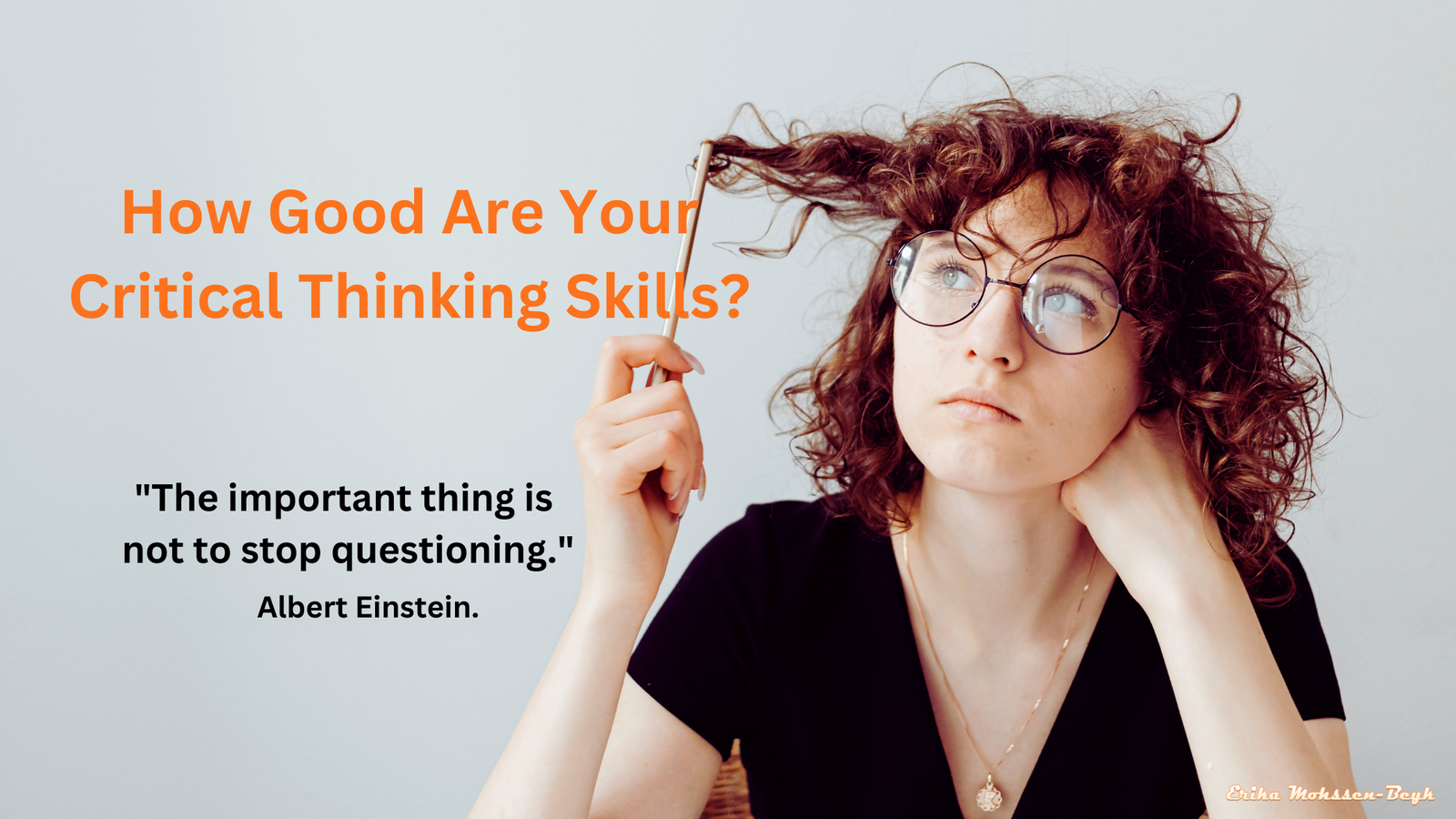
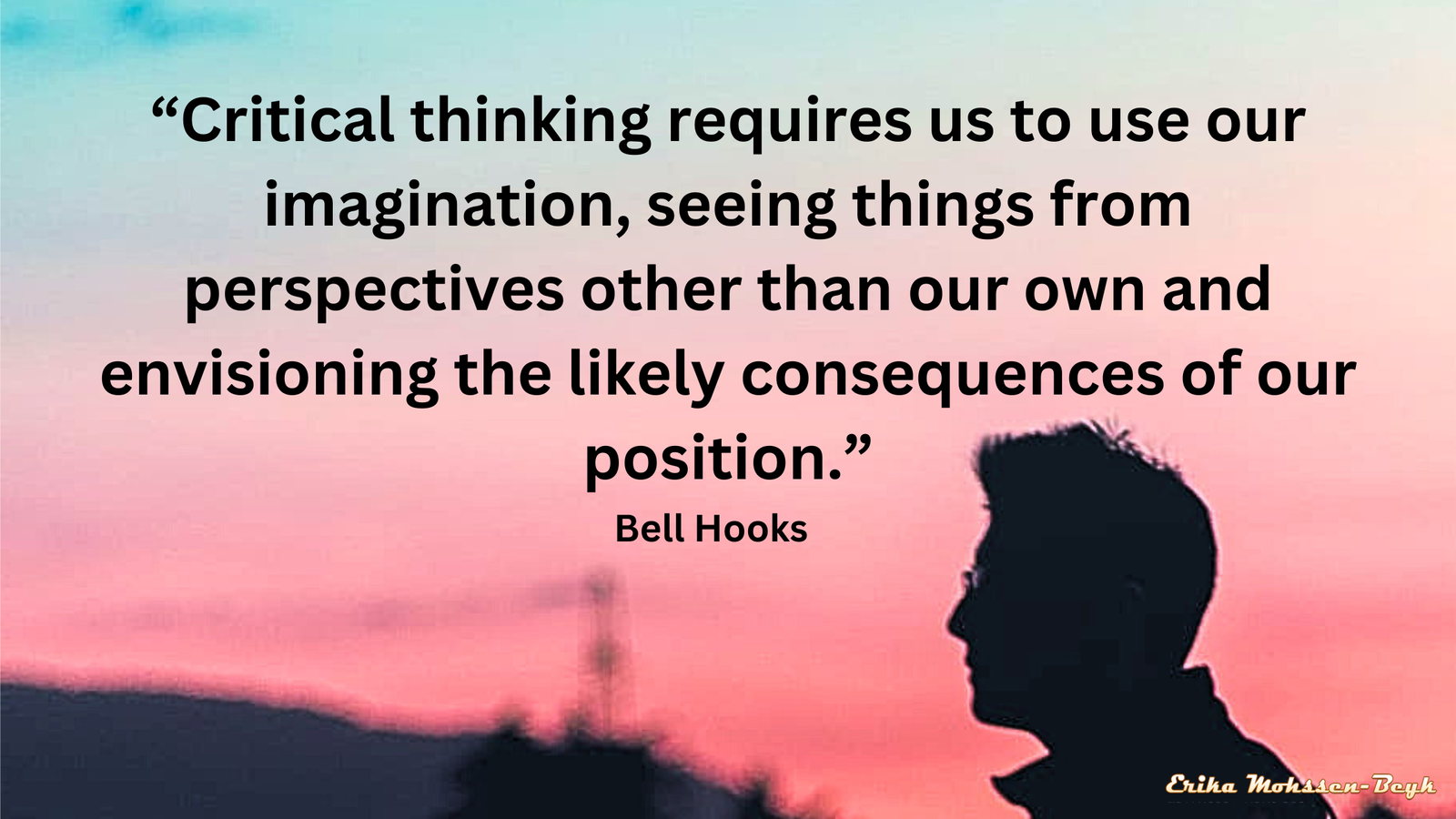
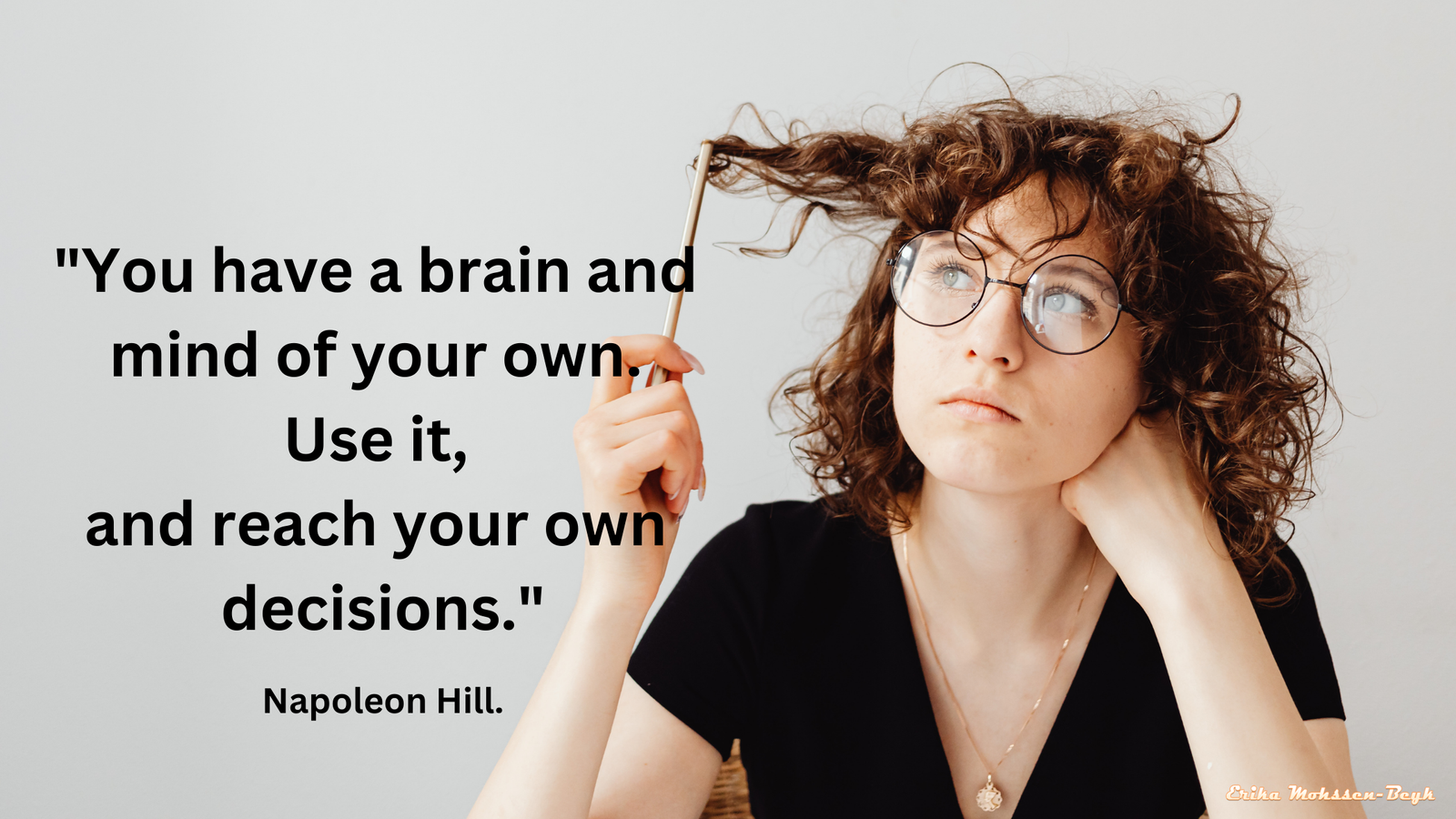



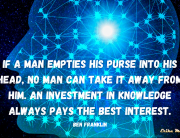

This thought-provoking blog encourages self-reflection on critical thinking skills. The insights shared prompt readers to assess and strengthen their ability to analyze, evaluate, and solve complex problems effectively. A must-read for anyone seeking to enhance their critical thinking prowess and excel in various aspects of life! #CriticalThinkingSkills #ProblemSolving #AnalyticalThinking #SelfReflection
Aljamain,
I am glad that you liked my post and found it thought provoking.
Thank you for your comment
Erika
All excellent points Erika. Now is one of the best times to stand out because as more turn to AI to do their thinking for them, becoming numb skulls, critical thinkers will shine as brightly as ever. Thinking deeply is a skill. We need to spend time in quiet to hone and own this skill. Since the world acts out our thoughts, it is the #1 skill to develop, far and away. Being a critical thinker promotes peace of mind and also, worldly success in any endeavor.
Ryan
Ryan Biddulph recently posted…5 Writing Tips to Help You Become a Full Time Blogger
Right, Ryan, I was thinking about the same and it inspired me to write this post.
It shocked me to see how easy people can be manipulated in the last years. Also how little they know about the power of our body mind and spirit.
Yes, thinking is a skill we all need and awareness, especially now that AI creeps more and more into our lives.
Thank you for sharing your thoughts, Ryan
Erika
Hi Erika, I believe you are on to something about critical thinking – you need different points of view. You need to debate things as well to learn from others. That’s something we have gotten away from sadly. I think too many people are just scrolling through feeds instead of getting outside and in nature. However, I know Ryan above does get outdoors 🙂
Lisa Sicard recently posted…Parades Near Me: Exploring A Jubilant Experience
Hi Lisa,
You are right, asking questions and debating is not wanted anymore. We can see content gets banned and censored. Walking in nature I see most people with their gadgets and earplugs, they do not even hear the birds sing or see a tree. It is really sad. I never take a gadget with me if I go out.It seems people do not know who they are without this thing. But self-awareness is a key trait in critical thinking and personal growth.
Thomas A. Edison said: ‘Five percent of the people think; ten percent of the people think they think; and the other eighty-five percent would rather die than think.” and George Bernard Shaw: „Two percent of the people think; three percent of the people think they think; and ninety-five percent of the people would rather die than think.“ They could be right, even the population grew in between.
Thank you for sharing your thoughts, Lisa
Erika
Hey Erika Mohssen
A thought-provoking piece that challenges readers to assess their critical thinking prowess! This blog effectively presents a series of engaging scenarios to test one’s analytical abilities. The questions posed encourage introspection and promote personal growth. I found the tips provided for enhancing critical thinking skills to be practical and applicable in everyday life. An intellectually stimulating read!
Aadiv S recently posted…Top 15+ OTT Video Platform Providers In USA, UK & India 2022
Hi Aadiv,
yes, the intention of this post is to make think. I am glad you found the tips applicable and practical and hope it may inspire people to think about and practice critical thinking skills.
Thank you for your comment
Erika
Thank you for this insightful article, Erika. Critical thinking is indeed a vital skill in today’s information-saturated world. Your tips on strengthening critical thinking are practical and valuable. Let’s continue to encourage independent thought and open-mindedness in our rapidly changing society.
Shahzad,
yes, let us encourage independent thought and open-mindedness. It is very much needed in our time.
Thank you for your comments
Erika